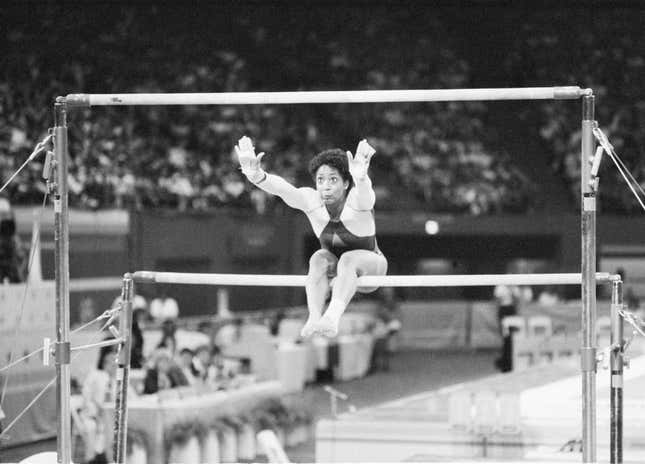
Before Dominique Dawes, Simone Biles and Gabby Douglas there was Dianne Durham. The first Black woman to win a USA Gymnastics national championship died in Chicago Thursday at age 52.
According to the Associated Press, Durham’s husband, Tom Drahozal, said that she died of a “short illness” in a Chicago hospital with him and her sister, Alice Durham, at her side.
“She passed peacefully,” Drahozal told ESPN. “She was the love of my life and everything I could have asked for. She was as beautiful a person away from gymnastics as she was within the sport.”
Durham—who was born in Gary, Indiana, on June 17, 1968—was 14-years-old when she won the all-around title at the 1983 U.S. National Championships.
From ESPN:
Known for her combination of grace, artistry and power, as well as her joyful personality, Durham and her teammate, Mary Lou Retton, pulled the sport of gymnastics into an era dominated by power tumbling and fast-paced progression.
The last gymnast to beat Retton in all-around competition, in the lead-up to the 1984 Los Angeles Olympics, Durham was deprived of a spot on the team due to a combination of injuries and politics.
But it is her achievement as 1983 senior national champion, which launched not only Durham but her coaches, Bela and Martha Karolyi, onto the national stage, for which Durham is most remembered.
“People said, you’re the first Black — I’m using ‘Black’ because ‘African American’ wasn’t a term in my era — national champion. Do you know that didn’t go through my head one time?” Durham told ESPN last summer. “Not one time. Do you know how many people had to tell me that? I could not understand why that was such a humongous deal.”
Durham may not have immediately understood at the time the significance of being a Black champion in a sport dominated by white women, but she was well aware of racism in America.
Days after the killing of George Floyd and amid the wave of anti-racism protests that followed, she posted on Facebook her disgust at “recent events in Georgia, Kentucky and Minnesota,” referring to the deaths of Floyd, Ahmaud Arbery and Breonna Taylor. She called their deaths a “step backwards” for racial progress in America before speaking on her own experiences of discrimination.
“In my own life and gymnastics career I encountered discrimination and prejudice,” she wrote. “It didn’t stop me from reaching all of my goals, but it did play a role in preventing me from reaching some of my biggest goals. I have been blessed to have had the support of family and friends of all races to help me get through the tough times.”
According to AP, it was an ankle injury she sustained on the vault event that led to Durham missing an opportunity to be on the U.S. Olympic team, but that would hardly be the end of her career in the sport.
In fact, Durham would go on to coach other gymnasts with the Karolyis in Houston, Texas, before moving to Chicago where she met her husband and became a national-level judge and a coach as well as the owner of her own gym.
“I’ve had so many former gymnasts send me messages today,” Drahozal told ESPN. “They said she was tough, a great coach who they loved and that she was a great role model for them. I think Dianne would want to be remembered for her personality, and also as a pioneer for minority gymnasts. She was one of the greatest gymnasts of her era, but she also opened the door for the great Black gymnasts who came after her.”

